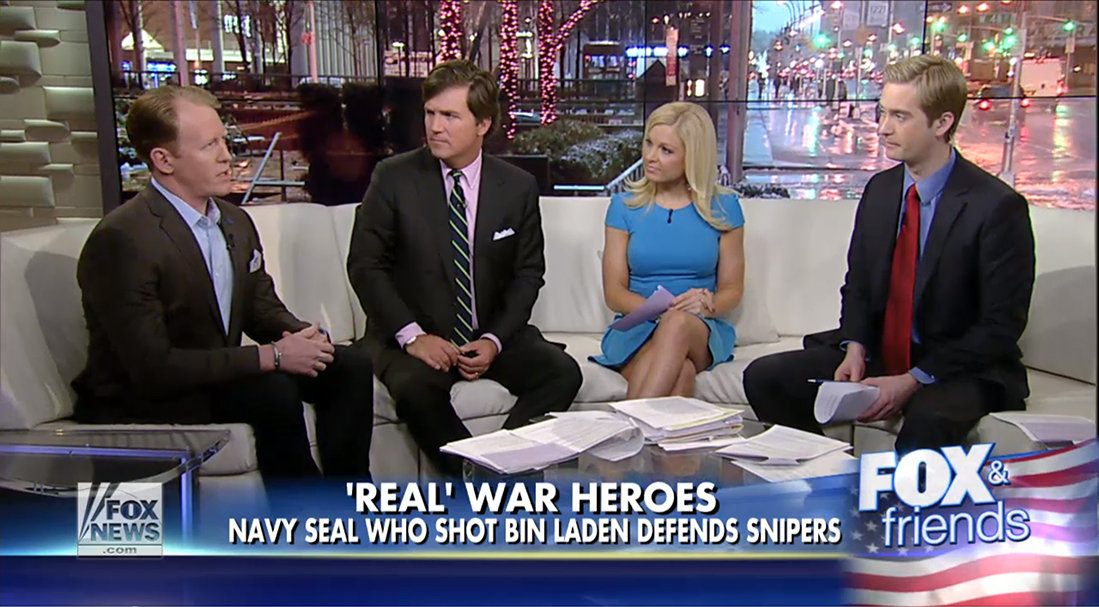Box Office Hit "American Sniper" Takes Hit From the Left

Rob O'Neill Shares Viewpoint on FOX & Friends.
Rob O'Neill recently returned to FOX & Friends to discuss the firestorm of controversy surrounding the film "American Sniper" directed by Clint Eastwood and starring Hollywood A-lister Bradley Cooper.
The film is based on the bestseller "American Sniper" written by former Navy SEAL Chris Kyle, regarded as the most lethal sniper in American history. After having survived four tours in Iraq, Chris retired from the military and began working with veterans with PTSD. In an awful, ironic twist of fate, Kyle was killed by a former Marine he was trying to help.
While a huge hit at the box office, the film's subject matter has been harshly criticized. Filmmaker Michael Moore recently referred to snipers as "cowards" on Twitter. Rolling Stone writer Matt Taibbi dubbed the film as "almost too dumb to criticize."
While "not surprised by the criticism," Rob O'Neill takes offense. Defending how integral snipers are in combat, O'Neill details how snipers saved his life on more than one occasion.
On the "Curvy Couch," Rob O'Neill sits down with FOX News' Anna Kooiman, Tucker Carlson and Peter Doocy.
Highlights of their exchange:
Doocy: "You say that snipers saved your life. Tell us about that."
O’Neill: "I've been on over 400 missions… Snipers did more than just sit there and protect us. They got us in. They found the routes. They found IADs on the way in." He adds, "Once we'd started hitting our targets, they'd cover our movement, look through doors and windows before we got there. It was not uncommon for us to be silent, only to hear shots go off. They (snipers) had spotted insurgents trying to ambush us. They saved our lives."
(O'Neill goes on to detail an experience he had…walking into a structure unaware of a hidden insurgent, ready and waiting with a machine gun setup. Suddenly, gunshots. The insurgent falls to the ground. O'Neill looks up to get a thumbs-up from the American sniper who saved his life.)
Carlson: "Having had that experience with snipers, having your own life saved by one. How do you respond to the criticism you're hearing, not just about the movie but of snipers in general?"
(Tucker refers to a recent quote from Rolling Stone writer Matt Taibbi, who panned the film as "almost too dumb to criticize.")
O’Neill: "I read what he thought of the movie. Just based on some of the stuff he's written, it seems like he hates America. He hates Hollywood. He hates the left. He hates the right. Yeah, he's a clever writer, but he doesn't know anything about it. He's never been to war. He can't judge these people."
Kooiman: "People who are part of the far left who maybe buy into this and read a lot of Rolling Stone. They think that war is so bad, that people who join the armed forces are trigger happy; they cling to their guns and their bibles. Where does this stereotype come from and why is it so wrong?"
O’Neill: "Well, they hated the Bush Administration so much that they despised the Iraq War and anything having to do with it. I really don't think it's personal to the guys that went. The guys that went went because they were told to go. There comes a point when you're not fighting for politics, you're fighting for the guy next to you. You're fighting for his life or her life." He further adds, "Because they weren't there, they associate us (military personnel) with their political beliefs and not with things that are really happening there. They're kind of in a bubble."
Doocy: "So much of the 'American Sniper' movie centers around the stress that was on Chris Kyle. How is the stress of a sniper who's watching his brothers in danger through a scope from above different than the stress of the guys who are breaking down the doors and searching houses?"
O’Neill: "Especially in Iraq when it was hot (2007), and I don't just mean hot with the enemy, I mean physically hot. A lot of these guys are in what they call 'hides' where it can get up to, what, a 135 degrees? They're up there and they have to keep their eyes on the people moving. They have to take the shot…the precise shot. They have to hit…and they have to be justified. The stress is definitely there."
